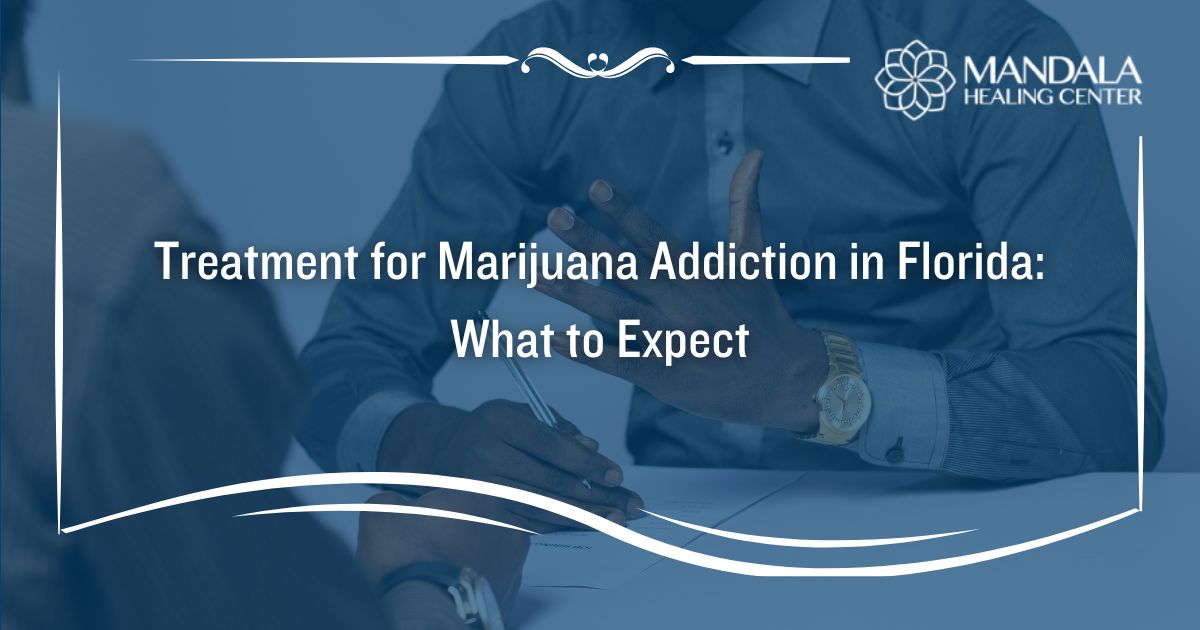When you think of a substance use disorder, you probably imagine someone abusing heroin or methamphetamine. While these are common drugs of abuse, addiction can stem from less obvious places. For example, many people struggle with marijuana addiction, even though some individuals view cannabis as a “safe” drug to abuse.
According to the Centers for Disease Control and Prevention (CDC), “Approximately 3 in 10 people who use cannabis have cannabis use disorder.”[1]
Marijuana addiction begins by consuming THC products occasionally. After a while, you might transition from occasional to daily use. Once you are smoking marijuana every day, you are at a high risk of developing an addiction.
If you are addicted to marijuana, you may experience withdrawal symptoms when you stop smoking it. While marijuana withdrawal is not severe, it still requires professional support. Thankfully, cannabis addiction treatment programs in Florida will provide you with detox, individual therapy, group counseling, relapse prevention, and more to help you achieve long-term sobriety.
In this article, you will learn:
- What are the signs of weed addiction?
- What is a marijuana addiction treatment center?
- What should you expect during a cannabis rehab program in Florida?
Signs of Marijuana Addiction
If you are smoking weed every day, chances are that you are experiencing a substance use disorder. While it can be difficult to spot the signs of addiction yourself, being aware of the symptoms can help you decide whether it’s time to seek treatment.
The main signs and symptoms of marijuana addiction include:[1]
- Using more weed than you intended to
- Trying but failing to quit smoking marijuana
- Spending a lot of time obtaining and using weed
- Experiencing urges or strong desires to use cannabis
- Using marijuana even though it causes problems at home, school, or work
- Continuing to use weed despite experiencing social or relationship issues
- Giving up important activities with friends or family members to smoke weed
- Using marijuana in high-risk situations, such as while driving
- Needing to increase your dose of cannabis to experience the desired effect
- Dealing with withdrawal symptoms when you stop using marijuana
If you have at least two of the symptoms, you are experiencing a cannabis use disorder. While recovering from addiction can be difficult, there are a variety of treatment options to ensure you get the care you need. The highest level of care is known as inpatient treatment, which allows you to live at the facility and receive 24/7 support during the early stages of sobriety.
How Does Marijuana Addiction Treatment in Florida Work
Treating cannabis use disorder requires effective treatments and evidence-based services. Just like heroin or meth addiction, recovery from marijuana abuse involves medical detox, therapy, and relapse prevention.
During a marijuana addiction treatment center in Florida, you should expect:
Intake and Assessment
The first step in substance abuse treatment is always intake and assessment. The intake specialists will take your health insurance or payment plan information and have you sign medical release forms.
Once all the forms are signed, you will begin an in-depth assessment. Medical professionals will ask you questions about your physical and mental health as well as your history of marijuana abuse. The information gathered will be used to create a treatment plan solely based on your needs.
Medical Detox
After your treatment plan is created, you will begin medical detox. The effects of marijuana withdrawal can include symptoms like cravings, insomnia, irritability, anxiety, excessive sweating, and more. Your doctor will provide you with medications that target specific symptoms that you are dealing with, keeping you safe and comfortable throughout the process.
Evidence-Based Therapies
When you complete detox, you will begin focusing on the psychological and behavioral aspects of marijuana addiction recovery. Individual therapy and group counseling are both used to help you address the root causes of your substance abuse, develop healthy coping skills, learn emotional regulation techniques, and more.
During both types of therapy sessions, you will be participating in therapeutic methods that are clinically proven to be effective in reducing substance abuse and addictive behavior. Examples of evidence-based therapies include:[2]
- Cognitive behavioral therapy (CBT)
- Motivational interviewing (MI)
- Contingency management (CM)
- 12-step facilitation therapy
- The matrix model
- Family behavior therapy
Relapse Prevention and Aftercare
Before you complete your marijuana rehab program, you will engage in relapse prevention planning. This process involves identifying potential triggers for relapse and learning what types of coping mechanisms work for you. You may also create a plan of action to use in case you experience a relapse down the line.
Another important part of relapse prevention is aftercare programs. Your marijuana addiction treatment center in FL will provide the following types of aftercare services:
- Continued therapy
- Medication management
- Access to an alumni support group
- Referrals to outpatient rehab and sober living programs
- Recommendations on local support groups like 12-step meetings
- Case management services like vocational training and other life skills assistance
Get Connected to a Top-Rated Marijuana Rehab in Florida
If you or a loved one suffers from marijuana addiction, it’s time to seek professional help. At the Mandala Healing Center, we use an individualized and evidence-based approach to managing cannabis use disorders. In other words, our program will provide you with all of the tools and support you need to achieve long-term sobriety.
Contact us today for more information on our weed addiction treatment program in Florida.
References:
- The Centers for Disease Control and Prevention (CDC): Understanding Your Risk for Cannabis Use Disorder
- Science Direct: Evidence-based practices for substance use disorders
















